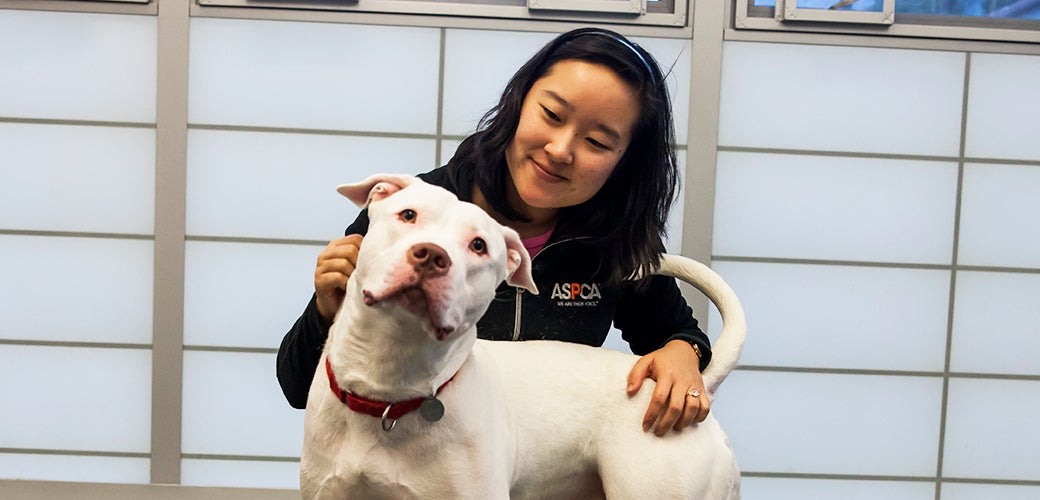How a board certified veterinary behaviourist differs from a traditional trainer
Comprehending the Duty of a Vet Behaviourist in Animal Training and Wellness
The role of a veterinary behaviourist is necessary in resolving the intricate relationship in between animals and their proprietors. They incorporate vet medication with understandings from animal actions science to tackle problems like aggressiveness and stress and anxiety. Unlike traditional fitness instructors, their method concentrates on the underlying reasons of these actions. This nuanced viewpoint raises inquiries about the effectiveness of traditional training techniques and exactly how a deeper understanding can transform pet health. What approaches do they use to achieve these results?
What Is a Veterinary Behaviourist?
A veterinary behaviourist is a specific expert that concentrates on understanding and attending to the behavior problems of animals, particularly animals. Their expertise integrates vet medicine and animal actions scientific research, allowing them to detect and deal with a large range of behavior troubles - dog behaviourist near me. These experts commonly hold postgraduate degrees, such as a Master's or PhD in animal actions, and are licensed by appropriate companies, guaranteeing they possess a deep understanding of animal psychology
Vet behaviourists evaluate animals through detailed monitoring and evaluation, taking into consideration aspects such as genes, environment, and training background. They create tailored behavior modification strategies, which might consist of desensitization techniques, positive reinforcement strategies, and environmental adjustments. Cooperation with family pet owners is vital, as they offer guidance and assistance throughout the training process. Eventually, the goal of a vet behaviourist is to improve the well-being of the pet while promoting an unified connection between animals and their proprietors.
The Relevance of Comprehending Animal Habits
Understanding animal actions is crucial for both animal proprietors and professionals in the field of pet treatment, as it lays the structure for effective communication and training. Acknowledging exactly how pets perceive their setting and react to stimulations enables caretakers to create a much more harmonious living circumstance. Insight into behavior signs, such as body movement and articulations, promotes more powerful bonds between animals and their owners. By valuing the natural instincts and demands of various species, individuals can customize their training approaches to suit these elements, advertising far better knowing and participation. Additionally, a strong understanding of behavior scientific research help in identifying stress factors and potential triggers, permitting aggressive interventions. Generally, recognizing animal habits not only improves the well-being of pets but additionally enriches the experiences of those that care for them, eventually resulting in much healthier, better partnerships.
Usual Behavioral Issues Resolved by Vet Behaviourists
Veterinary behaviourists frequently deal with usual behavior concerns in pets, including hostility and concern reactions. They likewise concentrate on anxiety and stress management, which can substantially influence a pet's wellness. Comprehending these concerns is vital for developing effective training and treatment methods.
Hostility and Anxiety Reactions
While numerous pet dog owners may view aggression and fear responses as straightforward behavior concerns, these intricate responses commonly come from underlying anxiety or past trauma. Veterinary behaviourists play a crucial function in identifying the origin creates of these actions, which can materialize in various kinds, including growling, attacking, or excessive concern of specific scenarios. Comprehending these triggers is important for establishing reliable training methods customized to every pet dog's one-of-a-kind situations. Behaviourists employ methods such as desensitization and counter-conditioning to help animals handle their concerns and aggressiveness. Furthermore, they inform animal owners about proper management methods, stressing the significance of perseverance and consistency. Attending to aggression and concern feedbacks not only enhances the family pet's quality of life however additionally reinforces the bond in between animal and owner.
Anxiousness and Stress Management
Anxiousness and tension prevail issues that several pet dogs face, typically resulting from modifications in their atmosphere, lack of socialization, or previous unfavorable experiences. Veterinary behaviourists play a crucial duty in recognizing the underlying reasons for these concerns. They employ different methods, including behavioral adjustment, desensitization, and counter-conditioning, to assist pet dogs take care of anxiety. Furthermore, they may suggest environmental modifications, such as producing secure rooms or giving enrichment tasks that advertise relaxation. Cooperation with animal proprietors is necessary, as behaviourists direct them in recognizing their pet's signals and carrying out effective coping approaches. By dealing with anxiety and stress, veterinary behaviourists add substantially to improving the general wellness and quality of life for pet dogs and their family members.
Exactly How Veterinary Behaviourists Vary From Typical Instructors
Vet behaviourists differ from traditional trainers largely in their instructional histories and training. While standard trainers often concentrate on obedience and standard commands, veterinary behaviourists emphasize understanding and dealing with underlying behavior problems, incorporating clinical factors to consider right into their technique. This distinct emphasis allows them to provide an extra comprehensive treatment for pet dogs with complicated behavior difficulties.
Education and Training Differences
Comprehending the distinction in between veterinary behaviourists and typical instructors is necessary for pet proprietors seeking efficient training options. Veterinary behaviourists have advanced levels in veterinary medicine, commonly complied with by specialized training in pet behavior. This education and learning equips them to attend to complex behavioural problems that might stem from medical problems or psychological variables. On the other hand, standard instructors usually have qualifications from training programs that concentrate on obedience and basic commands without delving into the underlying emotional or medical aspects. While both specialists intend to improve pet practices, vet behaviourists can diagnose and treat behavioral issues holistically, incorporating medical expertise right into training techniques. This important difference highlights the value of picking the appropriate professional based on the pet's details requirements.
Concentrate On Behavioral Issues
Attending to behavioral concerns requires a nuanced method that differentiates vet behaviourists from conventional instructors. While traditional fitness instructors usually concentrate on obedience and standard commands, vet behaviourists discover much deeper right into the underlying root causes of problematic behaviours. They use a comprehensive dog behaviourist near me understanding of animal psychology and actions alteration strategies, which are rooted in clinical study. This competence allows them to recognize problems stemming from anxiousness, worry, or hostility, instead of simply resolving surface-level symptoms. In enhancement, vet behaviourists evaluate the family pet's total well-being, thinking about ecological factors and the animal's history. By integrating medical expertise with behavioral approaches, they supply customized options that advertise long-lasting behavioral modification, making sure both the animal's and proprietor's quality of life are significantly improved.
Clinical Considerations Consisted Of
While traditional fitness instructors might overlook underlying medical concerns, vet behaviourists focus on a comprehensive analysis of a pet's health and wellness as a foundational action in dealing with behavioral troubles. This approach permits them to determine potential medical problems that may add to undesirable practices, such as stress and anxiety, discomfort, or neurological disorders. By incorporating medical examinations into their technique, veterinary behaviourists can work together with vets to guarantee an alternative understanding of the family pet's well-being. Furthermore, they can advise suitable treatments or adjustments to training plans based on clinical findings. This substantial perspective identifies vet behaviourists from traditional fitness instructors, as they resolve both behavioural and health-related aspects, ultimately resulting in a lot more reliable and lasting outcomes for animals and their proprietors.

The Refine of Dealing With a Vet Behaviourist
Teaming up with a veterinary behaviourist includes a methodical technique to attending to a pet's behavior issues. The procedure begins with a considerable assessment, where the behaviourist gathers detailed details regarding the animal's background, atmosphere, and particular behaviors that are problematic. This typically consists of questionnaires, meetings with the animal proprietor, and often observations of the pet in its atmosphere.
Following the analysis, the veterinary behaviourist creates a customized treatment strategy that may consist of behavior adjustment techniques, training approaches, and, if required, referrals for medical examinations. board certified veterinary behaviourist. The plan is made to be useful and possible, ensuring that it fits effortlessly right into the animal owner's lifestyle
Subsequent follow-up sessions are necessary to monitor development, change strategies, and give support. This collective effort not only aims to change unwanted behaviors however additionally to enhance the total wellness of the pet, making certain a harmonious connection between the animal and its owner.
Enhancing Your Animal's Quality of Life Through Behavioral Support
Enhancing an animal's quality of life through behavior assistance is crucial for cultivating a healthy and meeting partnership in between animals and their owners (veterinary behaviour). Vet behaviourists play a vital function in determining and resolving behavior problems that may hinder a pet dog's wellness. Through customized techniques, they assist reduce anxiety, fear, and aggressiveness, eventually advertising a much more balanced and satisfied pet
Behavior support incorporates different techniques, consisting of positive support, ecological enrichment, and socialization. By carrying out these techniques, proprietors can create a nurturing environment that motivates positive actions. This not just boosts the family pet's emotional health and wellness however also reinforces the bond between pet and owner.
Additionally, regular examinations with a veterinary behaviourist guarantee that any arising behavioral issues are without delay resolved, stopping rise. In general, buying behavior support is a positive method that substantially enriches an animal's life, bring about enhanced physical and mental wellness end results.
Regularly Asked Questions
What Certifications Do Vet Behaviourists Possess?
Veterinary behaviourists commonly hold a veterinary degree, complied with by specialized training in pet behavior. Many likewise have qualifications from recognized organizations, demonstrating their experience in addressing animal habits problems and promoting general animal health.
Can Vet Behaviourists Prescribe Medication for Pets?


Vet behaviourists, having veterinary levels and specialized training, can certainly prescribe drug for pets. This capability permits them to resolve underlying behavior problems successfully, usually incorporating pharmacological therapy with behavior modification approaches for finest end results.
For How Long Does Behavior Modification Generally Take?
Behavior treatment period differs significantly, typically ranging from a couple of weeks to several months. Aspects affecting this timeline include the pet's specific issues, consistency of training, and the owner's engagement in the procedure.
Are Remote Consultations Offered With Vet Behaviourists?

Just how Much Does a Vet Behaviourist Examination Price?
The price of a veterinary behaviourist assessment commonly varies from $100 to $300, depending on variables such as place, experience, and session length. Additional charges may get follow-up appointments or specialized solutions.